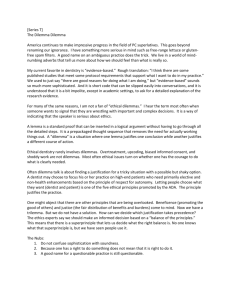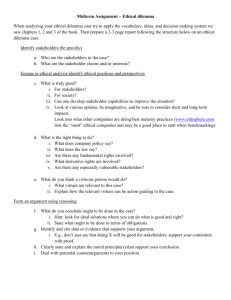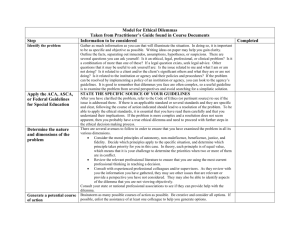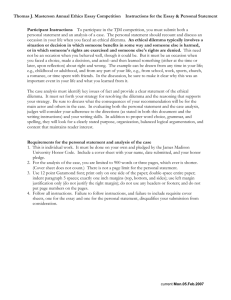Organizational Behavior (OB): - Management Home
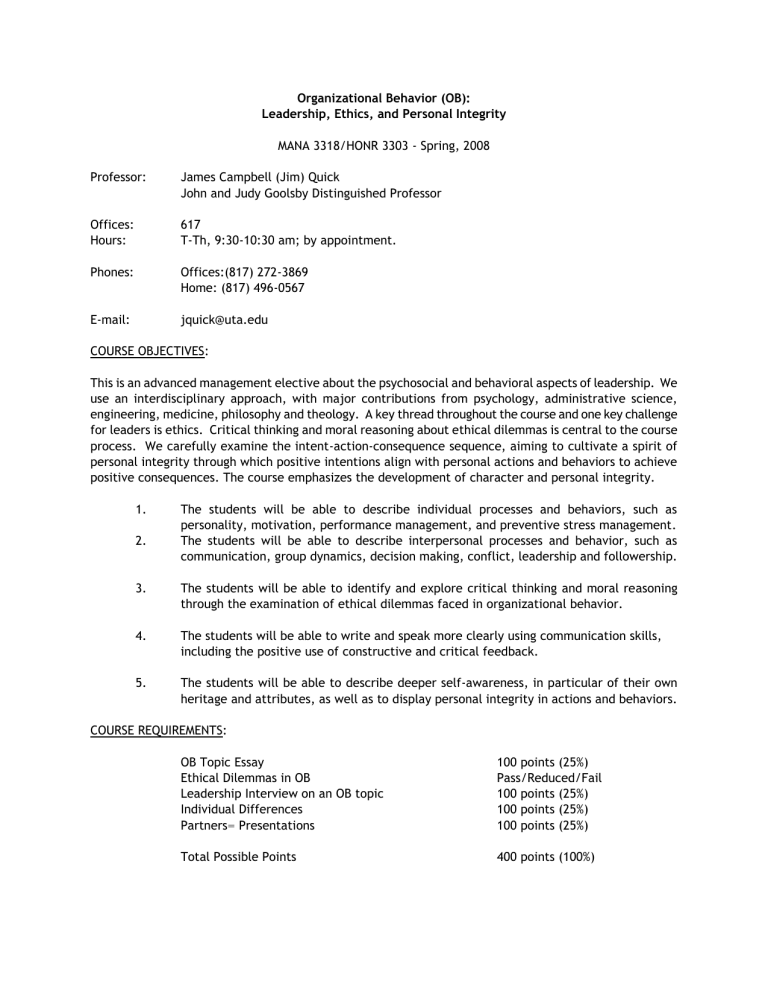
Organizational Behavior (OB):
Leadership, Ethics, and Personal Integrity
MANA 3318/HONR 3303 - Spring, 2008
Professor: James Campbell (Jim) Quick
John and Judy Goolsby Distinguished Professor
Offices:
Hours:
617
Phones: Offices:(817) 272-3869
Home: (817) 496-0567
E-mail: jquick@uta.edu
T-Th, 9:30-10:30 am; by appointment.
COURSE OBJECTIVES:
This is an advanced management elective about the psychosocial and behavioral aspects of leadership. We use an interdisciplinary approach, with major contributions from psychology, administrative science, engineering, medicine, philosophy and theology. A key thread throughout the course and one key challenge for leaders is ethics. Critical thinking and moral reasoning about ethical dilemmas is central to the course process. We carefully examine the intent-action-consequence sequence, aiming to cultivate a spirit of personal integrity through which positive intentions align with personal actions and behaviors to achieve positive consequences. The course emphasizes the development of character and personal integrity.
1.
2.
The students will be able to describe individual processes and behaviors, such as personality, motivation, performance management, and preventive stress management.
The students will be able to describe interpersonal processes and behavior, such as communication, group dynamics, decision making, conflict, leadership and followership.
3.
The students will be able to identify and explore critical thinking and moral reasoning through the examination of ethical dilemmas faced in organizational behavior.
4.
The students will be able to write and speak more clearly using communication skills, including the positive use of constructive and critical feedback.
5.
The students will be able to describe deeper self-awareness, in particular of their own heritage and attributes, as well as to display personal integrity in actions and behaviors.
COURSE REQUIREMENTS:
OB Topic Essay
Ethical Dilemmas in OB
Total Possible Points
Leadership Interview on an OB topic
Individual Differences
Partners = Presentations
100 points (25%)
Pass/Reduced/Fail
100 points (25%)
100 points (25%)
100 points (25%)
400 points (100%)
REQUIRED MATERIALS:
MANA 3318/HONR 3303/ 2
Texts: Debra L. Nelson and James Campbell Quick. (2006).
Organizational Behavior: Foundations, Realities, & Challenges, 5/E.
Mason, OH: Thomson South-Western.
References: George R. Goethals and Georgia J. Sorenson, General Editors
James MacGregor Burns, Senior Editor
Encyclopedia of Leadership: Volumes 1, 2, 3, and 4.
Thousand Oaks, CA: Sage Publications.
DETAILED EXPLANATION OF COURSE REQUIREMENTS:
OB Topic Essay
This is a 5-page, double spaced essay on a single topic using three to seven (3 - 7) articles or references, preferably in the past five years. In addition to the Encyclopedia of Leadership, possible sources include:
Academy of Management Perspectives
Business Ethics Quarterly
Encyclopedia of Bioethics
Harvard Business Review
Sloan Management Review
Organizational Dynamics
(Popular press articles are not acceptable; no newspapers, magazines, etc.)
The intent of this assignment is to become familiar with a particular topic in the OB literature which is of interest to you. After reading the material you select, you must bring that together with your personal experience or critical thinking. An essay is more than a summary of material or a regurgitation of what you have read. An essay must demonstrate synthesis, integration, and original thought.
Ethical Dilemmas in OB
It is easy to moralize, it is hard to reason morally. Moral reasoning is at the heart of good, ethical decision making. Moral reasoning only develops as it is exercised, and you exercise moral reasoning when you face ethical dilemmas. Nelson & Quick (NQ) include Ethical Dilemmas in each chapter, each dilemma having been crafted by Dr. Joanne Gavin who = s dissertation research was on character and transcendent decision making. We look at each OB topic through the lens of the Ethical Dilemmas. You are encouraged to prepare a one-page set of notes for each week = s discussion. If you miss two (2) Ethical Dilemma discussions, you will lose a letter grade in the class. Miss four (4) and you fail the course.
Leadership Interview on an OB topic
Each student selects an OB topic of interest (e.g., motivation, diversity, stress, communication) and conducts a face to face interview with an established organizational leader and/or alumnus of the College to gain insight into the topic from today = s organizational world of practice. A written summary of the interview must be turned in. The summary should cover general information pertaining to the interviewer = s perspective and experiences related to OB topic and the student = s personal insights as to how the information contributes to their development in this area.
Individual Differences: Assets and Liabilities
MANA 3318/HONR 3303/ 3
At the heart of self-awareness and personal integrity is an understanding of who you are and the impact of your behavior in the world. Last fall you completed the paper Who I am, What I believe. This assignment builds on that paper. Former U.S. Representative Dick Armey spoke about the many things people said they would do for him if he would help get their legislation passed. What Armey was more interested in was the question A What won = t you do (that is, what are your limits) in the interests of getting your legislation passed?
@ The answer to that question speaks to a person = s character...your character.
In this assignment, you are to identify your individual difference attributes. Individual differences are the basis for diversity in the workforce. The text identifies a number of individual differences for you, including ethnicity, sex, age, and religious affiliations. Once you have inventoried your individual difference attributes, you are to then discuss how they can be assets and liabilities. First, how can these be employed as assets in your career development? Second, how can these be liabilities,problems or obstacles in your development and advancement. Your grade is not based on the content of your individual differences, nor upon who you are as a person. Use text and other reference material as appropriate.
Partners = Presentations
To continue development of oral communication skills, teamwork, critical thinking, and conflict management, students will present a 10 minute oral presentation with a partner. Each pair chooses an ethical dilemma or personal integrity issue within an OB topic area and present solutions in a point B counter point format. Students are graded on verbal skills, ability to present clear alternatives and reasoning and to present differing viewpoints in a respectful and courteous manner. Cohort member evaluations are included. Additional guidelines for the partner presentations will be provided in class.
UT Arlington and CoBA Policies
Student Support Programs
The University of Texas at Arlington supports a variety of student success programs to help you connect with the University and achieve academic success. They include learning assistance, developmental education, advising and mentoring, admission and transition, and federally funded programs. Students requiring assistance academically, personally, or socially should contact the Office of Student Success
Programs at 817-272-6107 for more information and appropriate referrals.
Americans With Disabilities Act
The University of Texas at Arlington is on record as being committed to both the spirit and letter of federal equal opportunity legislation; reference Public Law 93112--The Rehabilitation Act of 1973 as amended.
With the passage of new federal legislation entitled Americans with Disabilities Act--(ADA), pursuant to section 504 of The Rehabilitation Act, there is renewed focus on providing this population with the same opportunities enjoyed by all citizens.
As a faculty member, I am required by law to provide "reasonable accommodation" to students with disabilities, so as not to discriminate on the basis of that disability. Your responsibility is to inform me of the disability at the beginning of the semester and provide me with documentation authorizing the specific accommodation. Student services at UTA include the Office for Students with Disabilities (located in the lower level of the University Center) which is responsible for verifying and implementing accommodations to ensure equal opportunity in all programs and activities.
Academic Honesty
MANA 3318/HONR 3303/ 4
Academic dishonesty is a completely unacceptable mode of conduct and will not be tolerated in any form at
The University of Texas at Arlington. All persons involved in academic dishonesty will be disciplined in accordance with University regulations and procedures. Discipline may include suspension or expulsion from the University.
"Academic dishonesty includes, but is not limited to, cheating, plagiarism, collusion, the submission for credit of any work or materials that are attributable in whole or in part to another person, taking an examination for another person, any act designed to give unfair advantage to a student or the attempt to commit such acts." (Regents' Rules and Regulations, Part One, Chapter VI, Section 3, Subsection 3.2,
Subdivision 3.22).
Drop Policy
It is the student's responsibility to complete the course or withdraw from the course in accordance with
University Regulations. Students will not be dropped by the instructor for non-attendance. Students are strongly encouraged to verify their grade status before dropping a course after the first withdrawal date. A student who drops a course after the first withdrawal date may receive an "F" in the course if the student is failing at the time the course is dropped. Please refer to the Undergraduate and
Graduate catalogs and the Schedule of Classes for specific university policies and dates.
Policy on Nonpayment Cancellations
Students who have not paid by the census date and are dropped for non-payment cannot receive a grade for the course in any circumstances. Therefore, a student dropped for non-payment who continues to attend the course will not receive a grade for the course. Emergency loans are available to help students pay tuition and fees. Students can apply for emergency loans by going to the
Emergency Tuition Loan Distribution Center at E. H. Hereford University Center.
COBA Policy on Bomb Threats
Section 22.07 of the Texas Criminal Law states that a Class A misdemeanor is punishable by (1) a fine not to exceed $4,000, (2) a jail term of not more than one year, or (3) both such a fine and confinement. If anyone is tempted to call in a bomb threat, be aware that UTA has the technology to trace phone calls. Every effort will be made to avoid cancellation of presentation/ tests caused by bomb threats to the Business Building. Unannounced alternate sites will be available for these classes.
If a student who has a class with a scheduled test or presentation arrives and the building has been closed due to a bomb threat, the student should immediately check for the alternate class site notice which will be posted on/near the main doors on the south side of the Business building. If the bomb threat is received while class is in session, your instructor will ask you to leave the building and reconvene at another location. Students who provide information leading to the successful prosecution of anyone making a bomb threat will receive one semester's free parking in the Maverick
Garage across from the Business Building. UTA's Crimestoppers may provide a reward to anyone providing information leading to an arrest. To make an anonymous report, call 817-272-5245.
COBA Policy on Food/Drink in Classrooms
College policy prohibits food and/or drinks in classrooms and labs. Anyone bringing food and/or drinks into a classroom or lab will be required to remove such items, as directed by class instructor or lab supervisor.
MANA 3318/HONR 3303/ 5
TOPICAL COURSE OUTLINE
Topic Tuesday date Reading Assignment
Assignment For
Guests/Exercises/Instruments Evaluation
____________________________________________________________________________________________________________________
INTRODUCTION TO OB...AND TO ETHICS, CHARACTER, AND PERSONAL INTEGRITY
Right and Wrong (?)
Ethical Climate
Straight talk...
Jan. 15
Jan. 22
Chapter 16 (T)
Chapter 1 (T)
The real world and you
Ethical dilemmas - what to do?
Ethical Dilemma - Brian
Opportunity & Success
Managerial challenges Jan. 29
Why be ethical? Why not?
INDIVIDUAL BEHAVIOR
Chapter 2 (T) Ethical Dilemma - Jill
Leadership Interview discussion
Feb. 5 Chapter 3 (T) Ethical Dilemma - Alice Personality
Attitudes and Behavior
Motivation
Performance Management
Feb. 12
Feb. 19
Feb. 26
Chapter 4 (T)
Chapter 5 (T)
Chapter 6 (Q)
Ethical Dilemma - Mitch
Ethical Dilemma - Donna
Are you a JackAss?
Ethical Dilemma - Sarah OB Topic Essay
Stress & Well-Being
BUSINESS WEEK
SPRING BREAK
Mar. 4
Mar. 10 - 14
Mar. 17 - 23
Chapter 7 (Q) Ethical Dilemma - Josh
MANA 3318/HONR 3303/ 6
TOPICAL COURSE OUTLINE (Continued)
Topic Week of Reading Assignment
Assignment for
Guests/Exercises/Instruments Evaluation
_________________________________________________________________________________________________________________
INTERPERSONAL BEHAVIOR
Communication Mar. 25 Chapter 8 (T) Ethical Dilemma - Pat Leadership Interview
Leadership Interviews
Teamwork and Teams Apr. 1 Chapter 9 (T) Ethical Dilemma - Greg & Michele
Leadership Interviews
Decision Making Apr. 8
Power & Politics Apr. 15
Leadership & Followership Apr. 22
Chapter 10 (T)
Chapter 11 (T)
Chapter 12 (T)
Ethical Dilemma - Beckman Services
Ethical Dilemma - James
Ethical Dilemma - Sam Diversity &
Individual Differences
Conflict
CONCLUSION
Self-awareness... personal integrity
Apr. 29
May 6
Chapter 13 (T)
Chapter 17 (T)
Ethical Dilemma - Scott
Partners = Presentations

